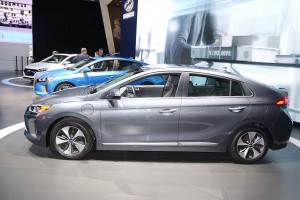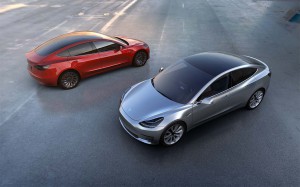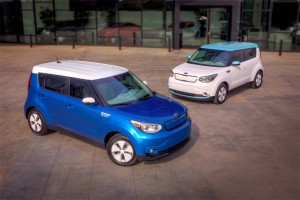
Hyundai will offer three version of the Ioniq: a regular hybrid, a plug-in and a pure battery model.
The Hyundai Ioniq hasn’t even come to market yet, but some analysts are arguing it’s already out of date.
The purpose-built model is designed specifically to use any of three different battery-based drivelines: conventional hybrid, plug-in hybrid or pure battery-electric. The latter is designed to deliver about 110 miles per charge. That’s slightly more than the original Nissan Leaf or Ford Focus EV, but still well short of what Tesla is planning with the Model 3 – or the 200 mile range from the upcoming Chevrolet Bolt.
But Hyundai apparently recognizes that “range anxiety” is a problem keeping lots of potential buyers out of the EV market and it intends to more than double what the Ioniq will initially offer before the end of the decade.
(Click Here to learn how Hyundai and Kia hope to become second in the green-car market.)
Company officials have told TheDetroitBureau.com they’re working up longer-range models, but they’ve apparently been a bit more specific in an interview with Automotive News, suggesting the maker will have a 250-mile EV in its line-up before the end of the decade.
According to green powertrain executive Ahn Byung-ki, developments in battery technology are improving at a rapid rate and getting the necessary hardware should be in place within the next several years.
Indeed, a variety of industry sources tell TheDetroitBureau.com that all the right developments are beginning to come together. GM, for example, is expecting to pay about $150 per kilowatt-hour for the Bolt’s cells, down from around $1,000 per kWh at the beginning of the decade. Tesla – which will produce its own lithium-ion batteries at the new Gigafactory in Reno, Nevada – hopes to get the numbers even lower.
(Tesla launches new, lower-priced version of Model X battery-SUV. Click Here for more.)
Energy density – the amount of power that can be stored in a given size and mass – is also increasing at a fair clip, though perhaps not as quickly as some would hope. Nonetheless, that became apparent when Chevrolet launched the second-generation Volt plug-in, increasing its range by roughly 50% per charge and cutting the size of the pack enough to increase seating capacity to five.
One of the remaining challenges to widespread acceptance of plug-based technology is charging times, but even there, more automakers are beginning to equip their vehicles to use the small but growing number of high-speed Level 3 chargers popping up around the country.
As TheDetroitBureau.com has reported, Hyundai and sibling Korean carmaker Kia expect to have a combined total of 10 standard hybrids, eight plug-ins, or PHEVs, and another eight pure battery-electric vehicles in their line-up by the end of the decade – as well as one hydrogen fuel-cell vehicle for each of the brands.
Whether all those BEVs will feature long-range battery packs, Hyundai isn’t saying. Nor is the maker discussing whether it may increase the range of the Ioniq, in particular. But with the vehicle specifically designed to make use of alternative powertrain systems, some observers believe Hyundai very specifically left open the option of a battery-pack upgrade before the end of the new model’s lifecycle – which will stretch out to around 2023 or 2024.
In the meantime, Ahn said he wasn’t concerned that the Ioniq has missed the mark. While it won’t have the range of a Bolt or Model 3, it will be cheaper, for one thing. And while 110 miles is barely equal to a half-tank of gas, Hyundai is betting there are still plenty of folks who will find that more than adequate for most of their routine, day-to-day needs.
(VW planning to launch 30 battery-cars by 2025. Click Here for the story.)


